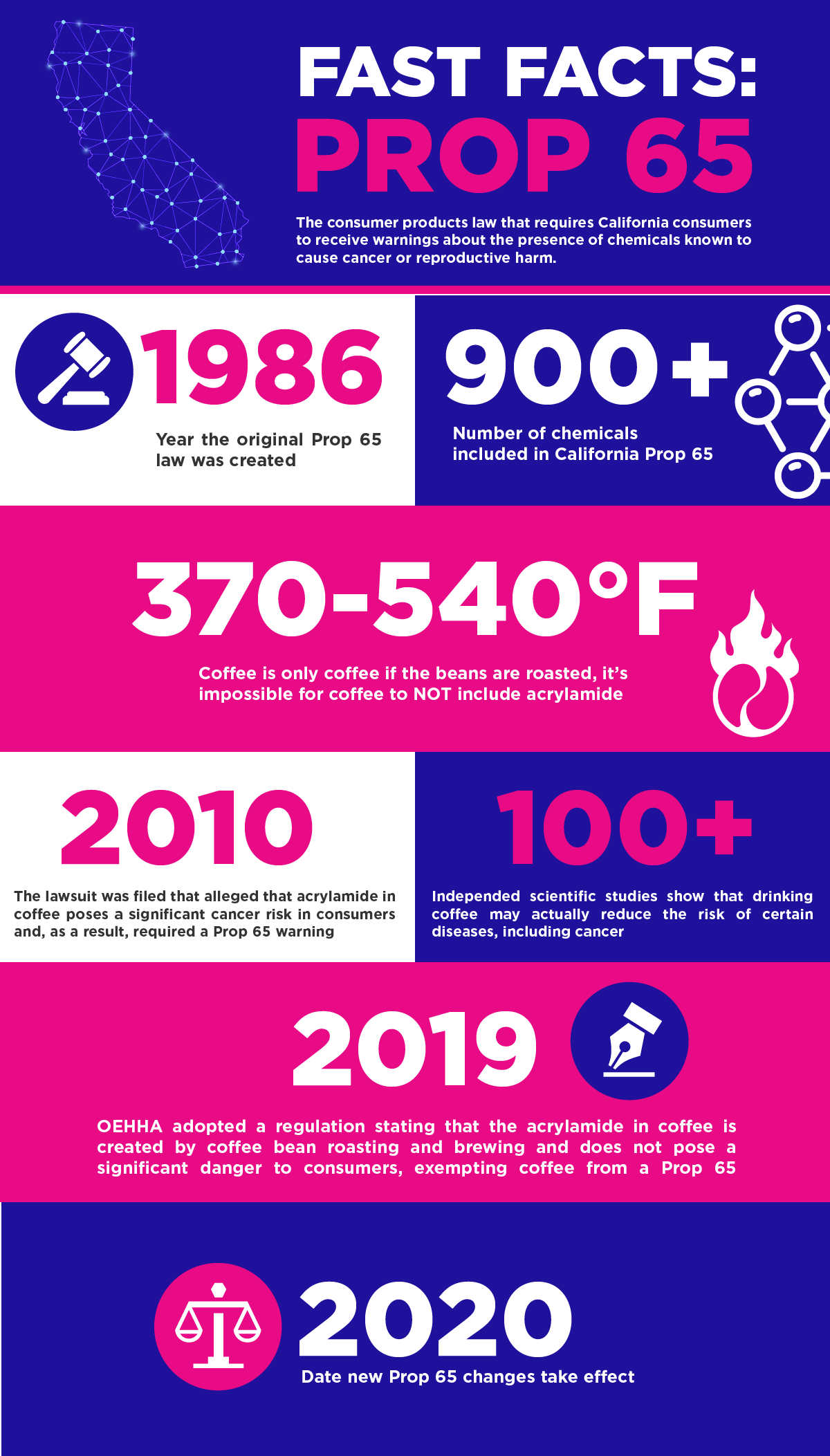No products in the cart.
Does prop 65 apply to coffee
For decades, the coffee industry fought against Proposition 65, a California law that requires warning labels on consumer products that contain chemicals known to cause cancer. Since roasted coffee beans, and the coffee brewed from them, contains acrylamide -- a chemical of concern under Prop 65 because of potential cancer risks -- coffee roasters, chains, and cafes had to include this warning on their products. Or at least they did until 2020, when a judge ended a decade-long lawsuit alleging that dozens of California coffee roasters and retailers, including Starbucks, violated Prop 65.
In this blog we’ll discuss the history behind Prop 65, how it affected the coffee industry, and what the 2020 ruling means for coffee roasters and retailers in the state.
Proposition 65: An overview
Prop 65 is a consumer products law that requires California consumers to receive warnings about the presence of chemicals known to cause cancer or reproductive harm. If you live in California, you’re familiar with the warning -- it can be found pretty much anywhere, from the backs of French fry boxes and electronic products to signs on the entrances of public buildings. The warning is so commonplace that it’s virtually impossible to go a day without coming across one.
It became law in November 1986, when California voters approved it by a 63-37 percent margin. It’s clear that voters want to be warned about toxic chemicals, but the law is constantly evolving, controversial, and exceedingly difficult to enforce. For example, the list of toxic chemicals includes over 900 chemicals, some of which are environmental, naturally occurring, and impossible to avoid, like acrylamide, the “problem chemical” in coffee, fried chicken, and burnt toast, among other foods.
So, what’s acrylamide?
Acrylamide is a compound commonly found in cosmetics, toiletries, papers, and textiles, but it also forms naturally during high-heat cooking methods, including fried, baked, and roasted foods. It’s more likely to accumulate when foods are cooked at higher temperatures for longer periods of time. Considering coffee beans are typically roasted at 370-540°F for up to 20 minutes, and coffee is only coffee if the beans are roasted, it’s impossible for coffee to NOT include acrylamide.
Food and cigarette smoke are the two major sources of acrylamide exposure for the general population, although it’s important to note that people who smoke have 3-5x higher levels of acrylamide markers in their blood than non-smokers, regardless of their diets. Problem foods include French fries, potato chips, crackers, bread, cookies, breakfast cereals, canned black olives, prune juice, and coffee.
Acrylamide & cancer risk (in food)
Although various studies have shown a clear link between acrylamide exposure and an increased cancer risk in lab animals, studies on the effects of acrylamide on cancer development in humans have mixed results. In fact, the National Cancer Institute and the American Cancer Society point out that no scientific studies convincingly link acrylamide in food to cancer or other such health issues in humans.
Here are links to just a few studies and a brief look at their results:
A 2015 study on dietary acrylamide and cancer risk concluded that it’s not associated with a higher risk of the most common types of cancer.
Another large review noted no significant association between dietary acrylamide and cancer.
According to this review, it could be tied to a higher risk of lymphatic and skin cancer in men.
As you can see, the results are mixed and it’s important to note that these are observational studies -- they look at the association between acrylamide and cancer but don’t account for other factors that may be involved, such as lifestyle or family history. Per Healthline, additional long-term trials are needed before a link between the two can be determined.
Prop 65 & coffee roasters: The litigation
Despite the clear lack of evidence showing that acrylamide in food increases cancer risk in humans, a lawsuit was filed in 2010 that alleged that acrylamide in coffee poses a significant cancer risk in consumers and, as a result, required a Prop 65 warning. For obvious reasons, coffee roasters and retailers in the state fought back against the litigation.
After all, hundreds of independent, peer-reviewed scientific studies show that drinking coffee may actually reduce the risk of certain diseases, including liver cancer, endometrial cancer, Parkinsons, Alzheimers, and diabetes, among others. Plus, the World Health Organization, after reviewing the total body of research regarding coffee and its link to cancer, concluded that coffee is not a known carcinogen and may even help protect against some types of cancer.
Despite the growing body of evidence in favor of coffee roasters, they lost a Phase 1 trial and agreed to include Prop 65 warning labels on their products and in their stores. On top of that, they also agreed to pay millions in a settlement as the litigation moved along. This was bad news for coffee roasters, who were concerned that the warning labels were not only unnecessary but infringed on the accessibility of their products in the state. Fast forward to 2019, when everything changed.
OEHHA’s regulation changed everything
In June 2019, the California Office of Environmental Health Hazard Assessment (OEHHA) adopted a regulation stating that the acrylamide in coffee is created by coffee bean roasting and brewing and does not pose a significant danger to consumers, exempting coffee from a Prop 65 warning. This came one year after the FDA issued a statement in support of such regulation. On August 25, 2020 a California court judge officially ruled that the defense had successfully relied on OEHHA’s regulation to show that acrylamide found in coffee doesn’t cause cancer -- and the rest is history.
What does this mean for coffee?
So, what’s this ruling mean for coffee roasters and retailers in California? It means they no longer have to include Prop 65 warnings on their products. But, on a larger scale, it also highlights the long debated “value” surrounding consumer product warnings. How long will chemicals, such as acrylamide, with no proven cancer risk to humans remain on the list? Why is the burden on consumers to determine whether the Prop 65 warning on their food is legitimate or not?
Regardless, one thing is for certain: coffee companies and roasters in the state are officially exempt from Prop 65 warnings and can concentrate on what they do best: roasting the perfect cup of Joe.


Coffee & Prop 65: FAQs & information
As a coffee packaging distributor, we get a lot of questions from our California-based customers about Prop 65 warnings on their packaging. Here are just a few.
Do I need to include a Prop 65 warning on my coffee packaging?
Nope! OEHHA’s 2019 regulation, which became effective in October 2019, means that coffee roasters are exempt from Proposition 65 warnings. Per their statement, chemicals in coffee pose no significant risk to consumers.
Why do I sometimes see Prop 65 warnings on coffee?
They either don’t know about the latest information or are using old packaging. Since businesses had been given warnings prior to the 2019 ruling and are likely still using older packaging -- after all, as a coffee company, you know how expensive packaging can be.
Is there a connection between coffee and cancer?
The results are mixed. Some studies show a small risk, while others show no risk at all. Ultimately, more long-term studies need to be done before any kind of solid link is proven between coffee and cancer.
Will a Prop 65 warning be required on coffee in the future?
A warning could be required if another of the 900 chemicals is added to it, or if the product is somehow contaminated during the roasting, packaging, or brewing process. At this point, though, we think it’s unlikely that coffee in its current state will require a Prop 65 warning in the future.
Tags

